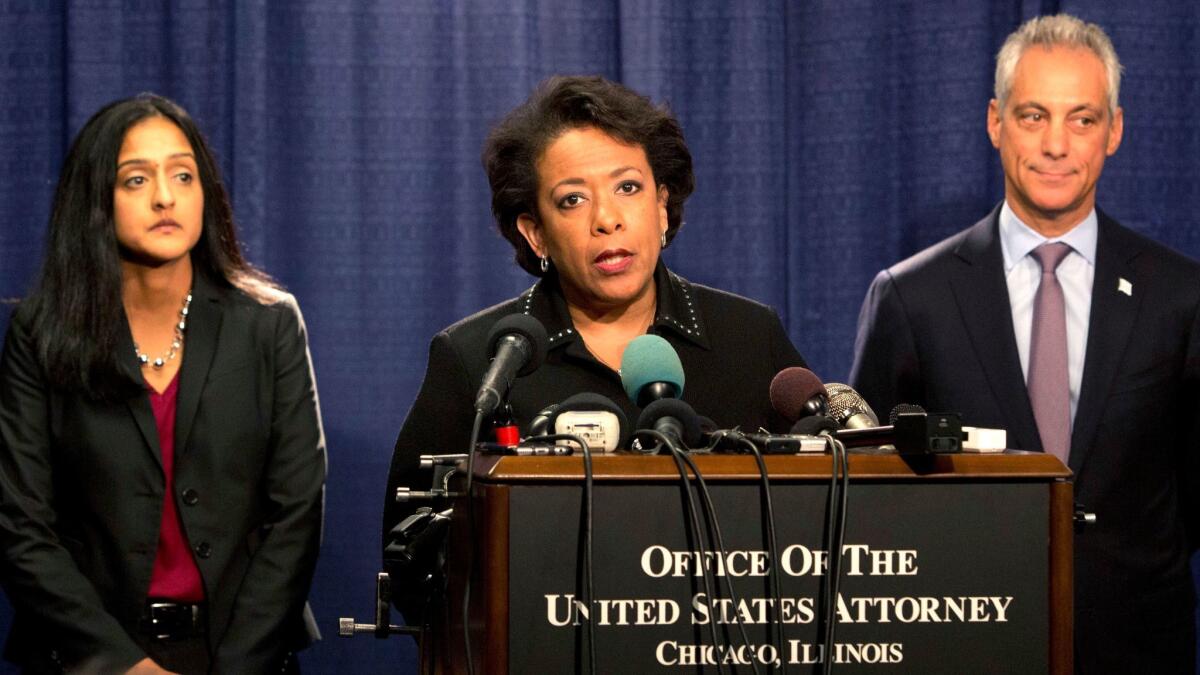Editorial: When to make a federal case out of the police

- Share via
The U.S. Department of Justice’s report finding unconstitutional police practices in Chicago was scathing yet unsurprising, coming as it did amid months of tension following the fatal 2014 shooting of black teenager Laquan McDonald by a white police officer and the much-delayed release of video depicting the incident. Importantly, though, the report was also something of a relief — it finally provided the city, its political leadership and its police an opportunity to focus on a diagnosis of the problem and recommended fixes.
That has been the chief value of the dozens of similar Justice Department civil rights investigations and reports into local police practices around the country: Anger simmers, recriminations fly but too often there is little progress or even movement until the feds step in. There is something tangible about alleged constitutional violations and the threat to take a city to court, and something useful about a detailed to-do list for getting a police department’s house in order.
Cities and especially police are often resentful of outside critique, but crisis can so easily turn to desultory stasis that some wind up welcoming in the Justice Department. In Chicago, both a high crime rate and mistrust of police endangered Mayor Rahm Emanuel’s political career, and the mayor appears to have embraced the Justice Department’s involvement as a blessing.
The Justice Department has often been the only effective force for driving actual changes in [police departments’] practices.
The department’s role in protecting civil rights is long, storied and a bit spotted, but its hands-on role in police reform was born in Los Angeles in 1991 when four LAPD officers were videotaped beating Rodney King. Following their acquittal on criminal charges, Congress conducted a series of hearings on the federal government’s role in preventing police misconduct. The sessions resulted in a 1994 law authorizing the attorney general to investigate cases involving a pattern or practice of conduct by law enforcement officers that violates the Constitution or rights protected under federal statutes.
The Justice Department made its first such findings after an investigation of the Pittsburgh Bureau of Police in 1997. Without admitting wrongdoing, Pittsburgh entered into a consent decree to reform policing practices in order to avoid litigation. Others followed, including Los Angeles in 2001, and more recently, Ferguson, Mo.; Baltimore; and Chicago. L.A.’s consent decree brought about a vastly improved, more accountable LAPD.
A defendant police department’s ability to enter into the consent decree without admitting fault is one of the key benefits of the process: It allows the parties to cut through the internal politics and battle lines.
It also underscores the Justice Department’s power over local policing and makes some observers uncomfortable about federal overreach. In hearings this week, attorney general nominee Jeff Sessions reiterated his belief that the Justice Department could improperly sue “good police officers and good departments” merely because individual officers have committed misconduct.
In that view he may, oddly, have at least a little in common with many of the angriest critics of the police. Individuals, this line of thinking goes, do bad things and ought to be ferreted out and punished. The difference between Sessions, a strong police supporter, and many anti-police activists is that Sessions sees police misconduct as rare and critics see it as common.
Throughout history there have been individual officers who act criminally and ought to be punished, and that hasn’t changed. But as the argument rages on about whether officers as a group are unfairly targeted or unduly protected, and whether some individual ought to be disciplined or prosecuted, the Justice Department has often been the only effective force for driving actual changes in practices.
In Baltimore, for example, the district attorney was praised by community activists for swiftly bringing criminal charges against officers involved in the 2016 death of Freddie Gray in police custody. Then three officers were acquitted, and prosecutors dropped charges against the others.
Following negotiations with the Justice Department, however, Baltimore formally agreed last week to reform its community oversight of police, upgrade and update training, improve its transportation of suspects, analyze problems in its mental health system, improve investigations of alleged employee misconduct — and to take further steps to overhaul police practices.
Local police departments are ostensibly independent from the federal government yet are in reality bound to them through funding and other support. Through the Civil Rights Division of the Justice Department, the Obama administration has played a valuable role in setting the standard for police performance. It’s a role no one else can fill, and it would be a shame if the Trump administration’s Justice Department slowed the progress.
Follow the Opinion section on Twitter @latimesopinion and Facebook
More to Read
A cure for the common opinion
Get thought-provoking perspectives with our weekly newsletter.
You may occasionally receive promotional content from the Los Angeles Times.







